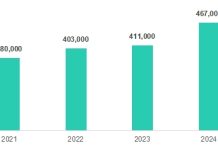New research among 1,000 working parents revealed an average savings of nearly US$7,000 (approx. S$9,500) a year on childcare from working in the hybrid model, with more than half (56%) of parents saying that they would struggle to pay for the childcare services required to cover a full five-day working week in a central office.
The study by International Workplace Group, the world’s leading provider of hybrid working solutions, with brands including Regus and Spaces, also found that three quarters (74%) would look for a new job if they were asked to travel to a central office five days a week.
The hybrid model allows parents to choose where to work – whether in the office, at home or from locations close to home (such as flexible workspaces), affording them more flexibility without compromising on productivity, as well as savings on childcare services.
Findings also underscore the significant impact hybrid working has on family dynamics, with 83% of respondents saying they are better parents as a result of the flexibility it offers. Furthermore, 89% reported being closer to their children, with 92% feeling more present, while 86% said their family’s quality of life has improved.
A key driver of improved family happiness has been the additional time afforded to parents by the reduction of long daily commutes. 84% of parents said hybrid working allowed them to spend more time with their children, with 85% saying they are now more involved in day-to-day parenting responsibilities.
In Singapore, a separate study has found similar sentiments to be true among local working parents, with the majority agreeing on the positive impact that flexible working arrangements bring on various aspects of their lives.
Eighty one percent (81%) of working parents in Singapore say that flexible, remote, and hybrid work arrangements would be most helpful for balancing career and parental responsibilities.
The Singapore government likewise continues to emphasise the importance of supporting parents with family-friendly workplace practices, including flexibility in terms of time and location to carry out their work duties.
According to the current study, nine in 10 parents (90%) report that hybrid working had empowered them to have a better work-life balance, which in turn is enabling more time for family activities.
This is particularly pronounced in the morning, with parents reporting that they have more time for breakfast together (67%), getting children ready for school (54%) and doing the school run (53%).
After school, parents said they can now more regularly help their children with homework (46%) and eat dinner with their family (49%), while 9 in 10 (90%) said they were now more able to be there for important milestones and events for their children, including parents’ evenings (52%), family birthdays (48%) and school holidays (51%).
On average, parents now have an additional five hours a week to spend with their families as a result of hybrid working, equivalent to 260 hours a year or an additional hour every working day. Almost a quarter (23%) of parents reported time savings of more than five hours a week.
Mark Dixon, CEO, International Workplace Group commented: “The ongoing and irreversible shift to hybrid working is having a transformative impact on the lives of millions of people globally.
“This latest research highlights how parents working in the hybrid model are enjoying a significantly improved work/life balance. Instead of wasting hours commuting long distances daily, they are now working locally, enjoying more of those important family moments that they were previously missing out on.”
Fatima Koning, group chief commercial officer, International Workplace Group commented: “Our research shows that flexibility is now a decisive factor in how and where parents choose to work.
“With parents currently making up 40% of the workforce, organisations that overlook this shift to the hybrid model risk falling behind and will struggle to attract – and retain – the best talent, as the modern workforce continues to demand adaptability. Ultimately, employers who embrace this are investing in a happier, more engaged workforce.”
International Workplace Group, the world’s largest provider of hybrid working solutions with brands including Spaces and Regus, added 867 new locations globally last year to meet growing demand for hybrid working.















